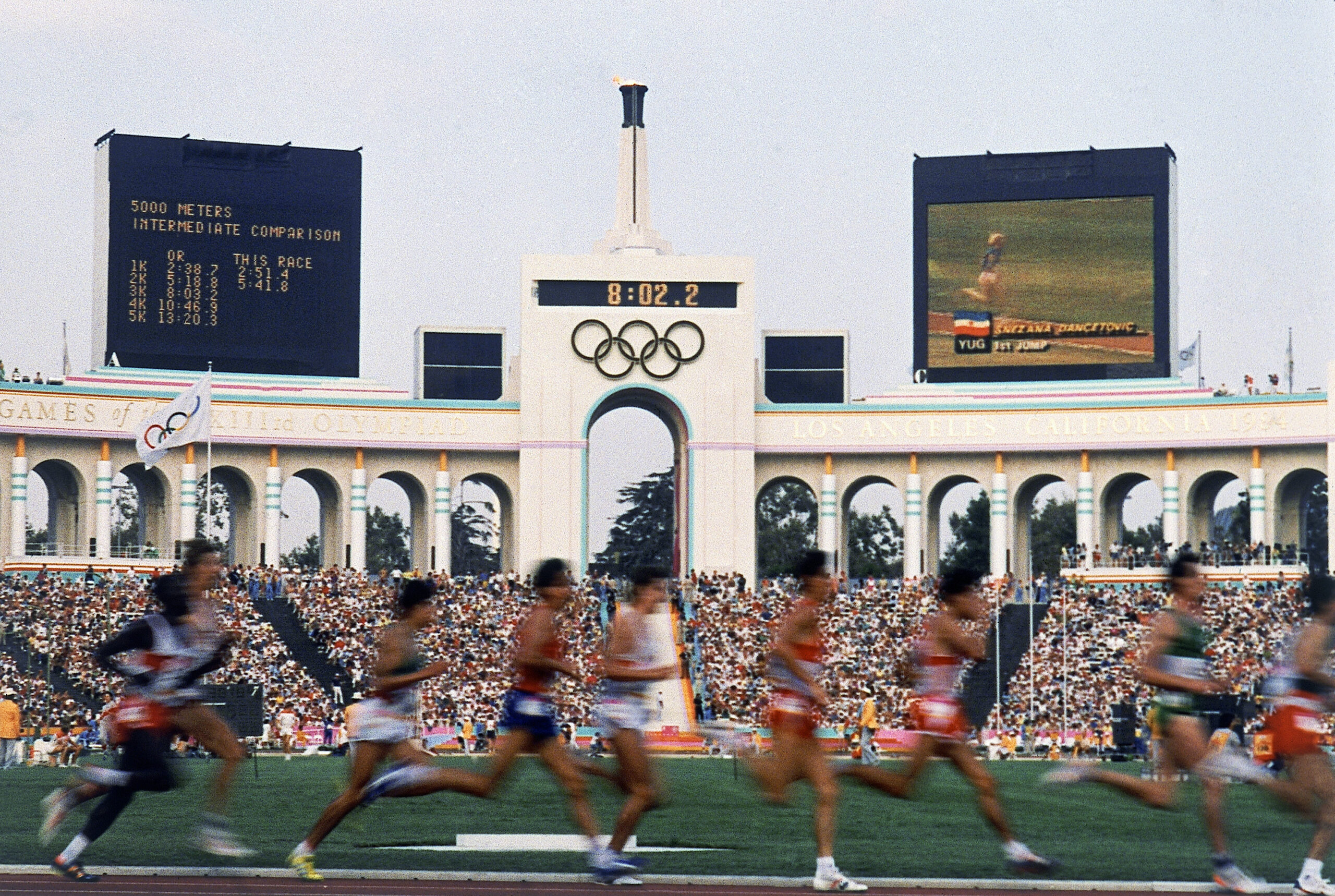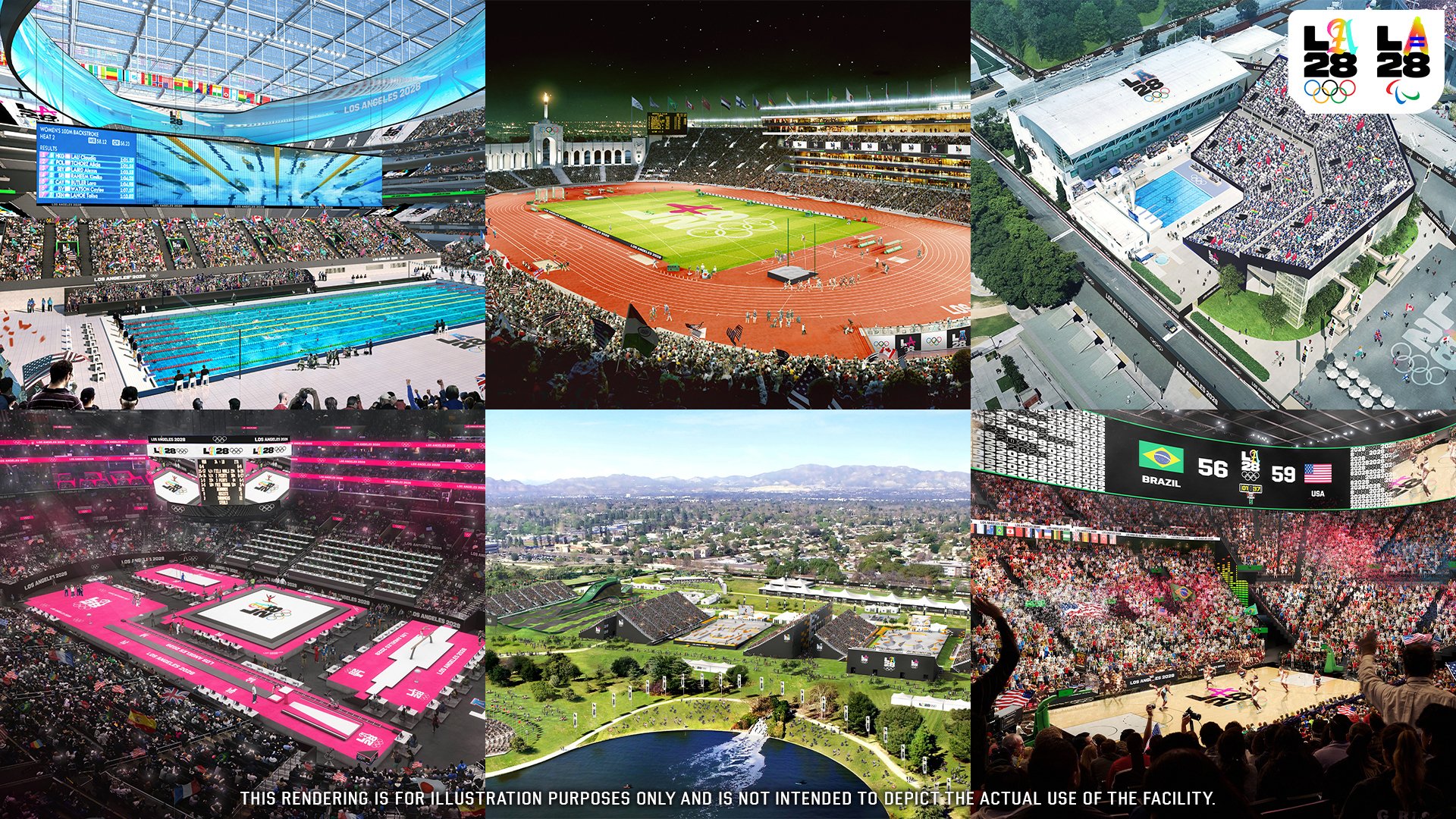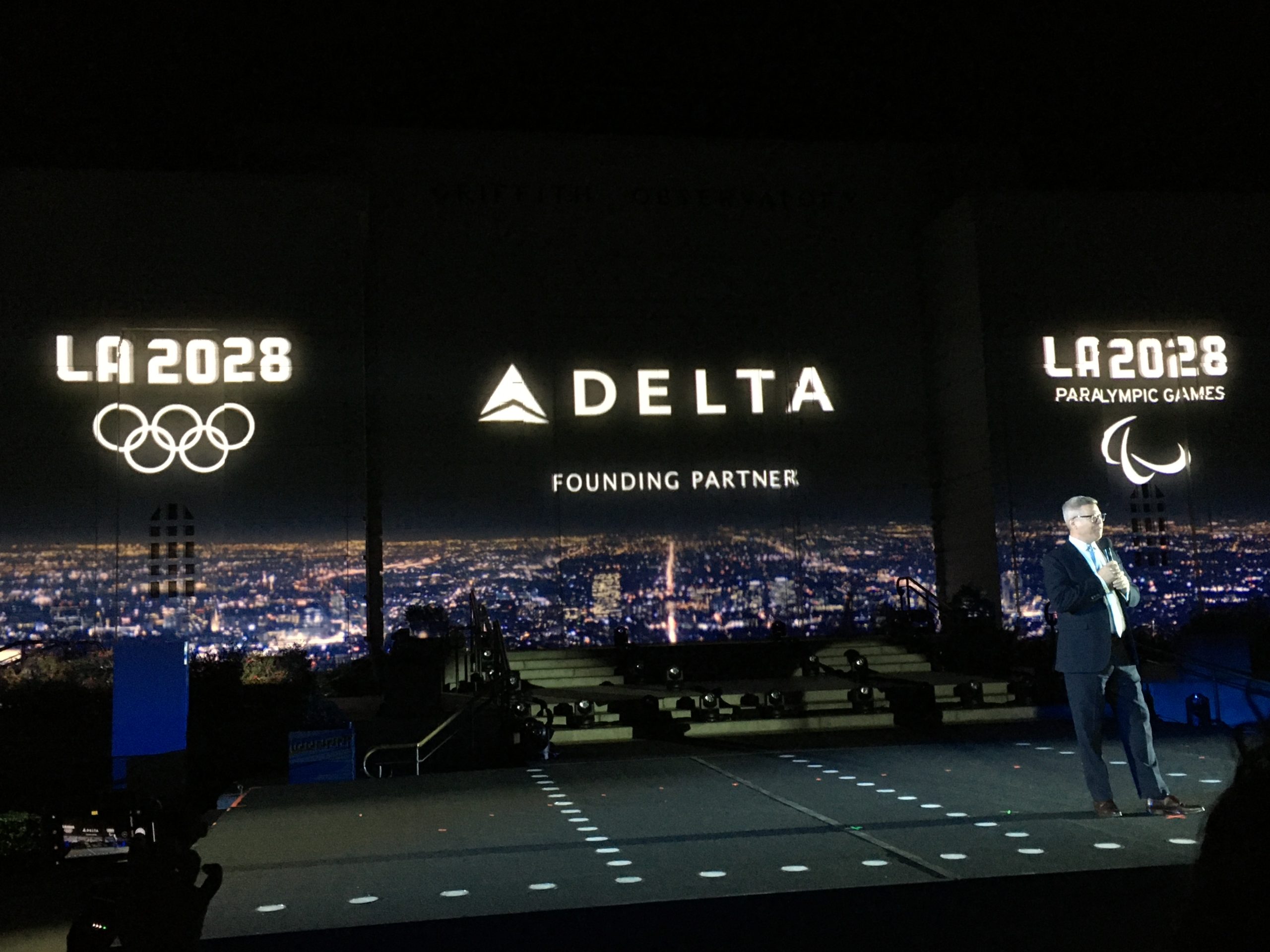
Yes, the 2024 Olympic and Paralympic Summer Games are in Paris and yes, competition begins in less than a week and yes, there will be plenty of focus on the present.
Yet within the U.S. Olympic movement, there is also a sense that this is just the preamble. Paris is a chance to re-light the Olympic flame within the United States, but a larger opportunity looms four years away.
It is 40 years ago this past Friday that the Opening Ceremony of the 1984 Olympic Summer Games was organized in Los Angeles. And in just under four years from now, on July 14, 2028, the Summer Games return to L.A. with the stakes potentially never higher.
Sponsored Content
“I don’t think we can overstate what it will be to have the Olympic and Paralympic Games in Los Angeles in 2028,” said Sarah Hirshland, chief executive officer of the United States Olympic and Paralympic Committee, at the Team USA Media Summit in mid-April. “It really is an opportunity then to showcase the city and the humanity of inviting the rest of the world. … It’s been a very, very long time since we’ve done that.”
And that long time will become very, very real once Los Angeles Mayor Karen Bass receives the Olympic flag during the Closing Ceremony on August 11.
“All eyes are on Paris and rightfully so,” said 3 Emerald Marketing’s Michael Lynch, a veteran of the Olympic landscape. “But once that handover happens in the Closing Ceremony, it’s your time to pull it all together. There’s excitement, there’s apprehension and there’s a little bit of panic because you’re no longer in the on-deck circle.”
Building Anticipation for LA28
The Olympic legacy within Los Angeles, having hosted twice prior and what will be a 32-year wait for another Summer Games in the U.S. by the time the torch is lit in 2028, is hard to ignore for American athletes even with competition imminent in Paris.
“Being an L.A. native, it’s something to even describe the emotions of walking into the pool in my home city,” said Ben Hallock, captain of the U.S. men’s water polo team. “My parents went to USC during the ’84 Games, so it’s something that I think about daily.”
Another easy way, so to speak, that LA28 can build anticipation off the Games in Paris is for a dominant performance from Team USA. The last time the U.S. team did not earn the most medals was in the 1992 Summer Games in Barcelona, when the Unified Team of former Soviet Union republics won the most.
“One of the big drivers of interest in any sporting event is the performance of the athletes,” said Cédric Vanden Bogaerde, the chief executive officer at the International Academy of Sport Science and Technology and someone who worked for 11 years at the IOC. “The performance of the USA team is certainly a factor that would play into creating the path toward a successful Games in L.A.”
“Being an L.A. native, it’s something to even describe the emotions of walking into the pool in my home city. My parents went to USC during the ’84 Games, so it’s something that I think about daily.”
Ben Hallock, U.S. men’s water polo team captain
“Hopefully we go into Paris, dominate and that will help bring in more viewership and more sponsors and more everything,” added U.S. men’s hurdler Kenny Bednarek while at the Team USA Media Summit in mid-April. “That’s something that we don’t want to fumble. When we get there, we want everything to go right for track and field — Paris would help jumpstart a lot of different things.”
Athletic success can portend more anticipation for LA28 from fans. But an individual’s athletic success in Paris can also pay off financially with increased attention for personal sponsorships in a world where financial support for athletes is a hot topic of debate.
“I always liked looking at those up-and-coming stars and supporting them on their journey not just at the Games, but also on the four years leading up to the Games themselves,” said Lynch, who led Visa’s global sponsorship marketing for the Olympic and Paralympic Games, FIFA World Cup and NFL from 1995 through early 2012. “I’d also want to look at some of the new sports. Think about flag football and in particular women’s flag football — you and I probably couldn’t name a woman’s star but guess what? They’re out there and they need to be discovered and they’re going to have stories to tell. And they need to be supported like any other athlete.”
One thing those surveyed for this story and beyond over the past months have pointed out is important for LA28: Write your own story instead of trying to be a sequel to 1984.
Those Games, competed under the shadow of a Soviet boycott, generated a profit of over $250 million in a time where the Olympic movement was marred by massive financial issues in Montreal, the 1976 host (when Los Angeles won the right to host the 1984 Games, it was the only official bidder). It was those Games that stand as perhaps the start of the “modern” Olympic movement with only two new venues constructed and a budget in part privately funded and in larger part thanks to widespread corporate support spearheaded by Peter Ueberroth.
“What made it so transformative back then was Peter’s vision of reaching out to the corporate community and the whole notion of true partnership with the corporate community to help fund sporting events,” Lynch said, later adding, “I don’t think anything can compare to what Peter did in ’84.”
Ready-Made Venues in Place
There are things that LA28 has to prepare and imagine from scratch. One thing that does not fall into that category is finding venues to host the full program; quite the opposite, in fact.
“The building of the main stadium in Atlanta (in 1996) is practically what broke the organizing committee, both financially and the management time and wise,” said Michael Payne, head of the marketing division of the IOC from 1989 through 2004 and who was a senior advisor for the LA28 bid. “Not having to worry about all of that is a massive relief financially, but importantly in management time. You’re able to focus on the operational delivery, which isn’t simple, but also then focus on the magic and what are the things that make it extra special.”

Coming up with magical scenes is part of the Hollywood mystique of Los Angeles and is sprinkled throughout some of the updated venue plans that have been rolled out over the past month-plus.
Off the success of the USA Swimming Trials in Indianapolis at an NFL venue, LA28 will have swimming at SoFi Stadium in Inglewood, meaning that track and field will be held immediately after the Opening Ceremony with swimming in the second half of the Games, bucking long-time tradition.
“I was fascinated the other day to see the first images released of some of the L.A. venues,” Payne said. “L.A. has an excess of stunning venues — their backup venues, most cities would be happy to have as their prime venues. In that sense, I think they are in a very good position.”
Carson and Long Beach will also host multiple events and basketball will be moved to Intuit Arena, which opens this fall as the new home of the Los Angeles Clippers, with Crypto.com Arena in downtown to host gymnastics. The Los Angeles Convention Center, which was used in 1984 as the main press center, will host fencing, judo, table tennis, taekwondo and wrestling with weightlifting at a theater across the street.
Golf will be at Riviera Country Club, which has hosted the U.S. Open and PGA Championship in the past. Badminton will be held at Galen Center on the University of Southern California campus. LA28 will also move softball and canoe slalom to Oklahoma City; through all the updated venue plans, the organizers said an estimated $156 million from its operating budget will be saved.
Boxing is not presently on the program for 2028 but may be added and a site found for it. Other sports without sites for now include modern pentathlon, sport climbing, baseball (although Dodger Stadium seems a perfect fit as host) and the four other new sports on the program: Cricket, flag football, lacrosse and squash. Track and field will be held at the Los Angeles Memorial Coliseum but work will be needed to install a temporary track.
Two of the new sports in particular could also bring potential additional star power; the NFL has not ruled out the idea of having its players participate in men’s flag as the competition dates of LA28 do not overlap with the NFL. Baseball has always been a tricky proposition within the Games dates although MLB Commissioner Rob Manfred did not dismiss the possibility after meeting with LA28 Chairman Casey Wasserman in February.
“I remain open-minded on that topic,” Manfred told the Baseball Writers’ Association of America during the All-Star break. “… when you’re in L.A., you focus on L.A. It is an opportunity that we need to think about.”
As for the LA28 organizers, there remains one thing on the to-do list to think about with the venue as well.
“What will be important for the L.A. team that’s coming to Paris is to really look and say, OK, what makes it special?” Payne said. “No disrespect to L.A., but they don’t have a city backdrop in the way that Paris does. So, what are they going to do that creates their magic? It’s the heart of the entertainment industry, there’s presumably a few creatives around who can help.”

Balancing The Books
“I always felt that the Olympic brand and that the whole idea about Olympic Games is much more important in U.S. than in Europe,” said BCW Sports Managing Director Lars Haue-Pedersen, adding “I’m sure sponsors will rush to be part of L.A. It’s still a unique proposition for a U.S. company with a domestic focus to be engaged in Olympic Games.”
Sponsorship has been a topic of discussion within the LA28 landscape. It landed a few deals before the pandemic, notably with Delta Airlines, but it recently lost a sponsor in Salesforce. A new agreement with Cisco was announced recently and LA28 has said it will generate $2.5 billion in corporate sponsorships as part of its estimated $7 billion budget. If it is unable to meet that sponsorship target, the concept of having taxpayer money cover debts could be in play (Rich Perelman at The Sports Examiner has an excellent breakdown of the financial outlook here).
“The excitement of hosting a third Olympics and our first Paralympic Games in Los Angeles, I think the Paris handover to L.A. will see a lot more in partner conversations and partner interest,” said Meghan O’Leary, director of commercial development and innovation at the U.S. Olympic & Paralympic Properties, at the Team USA Media Summit in mid-April. “It’s certainly an L.A. games, but it’s a U.S.-based Games. And I think there’s going to be a lot of excitement for the movement.”
That excitement, from the USOPP standpoint, will be based around athletic achievement above anything.
“We talk about this flame-to-flame programming,” O’Leary said. “In the storytelling around Team USA athletes, getting that story out and articulating their journey … these athletes are living their lives four, eight years at a time that culminate in the moment that we get to enjoy them. What I’ve seen with USOPP is that partners want to be a part of that story. So it’s our job to understand how to capture them in really interesting ways, package them in a way that a partner feels like they can come to life through them.”
Opportunities are all around for the Olympic movement in Los Angeles, both for Team USA and the IOC. Yet with plans, logistics and sponsorship possibilities, one primary point rises above them all.
“As long as everybody remembers that it’s not just another sports event — it’s the Olympics,” Payne said. “What is it that makes the Olympics special? It is the 210 countries coming. It’s not just solely about America. You’re the host inviting the world.”












 Copyright © 2025 by Northstar Travel Media LLC. All Rights Reserved. 301 Route 17 N, Suite 1150, Rutherford, NJ 07070 USA | Telephone: (201) 902-2000
Copyright © 2025 by Northstar Travel Media LLC. All Rights Reserved. 301 Route 17 N, Suite 1150, Rutherford, NJ 07070 USA | Telephone: (201) 902-2000